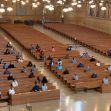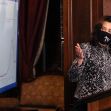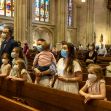The Kentucky governor ordered schools in his state to close due to the explosion of COVID-19 cases and deaths in the US. Some Kentucky schools remain open even while the virus rages, ignoring the orders and fighting them in the Supreme Court.
In a series of press briefings, Democratic Governor Andy Beshear of Kentucky communicated the withering impact of coronavirus on his fellow Kentuckians. Of the 120 counties in the state, all but 5 are experiencing critical rates of spread. Kentuckians have an almost 10% positivity rate — nearly 2,000 people have died at the time of this writing.
The rapid spread is due, in part, to no cogent federal strategy and a hyper-politicized response to the virus mitigation efforts for millions of Americans.
In efforts to stymie this aggressive spike — to save lives — Governor Beshear signed an executive order to close Kentucky schools on November 20th and reopen in January. Students would continue attending school through remote learning methods already deployed in the state.
The Governor’s orders were meant not only to mitigate the spread of the virus but also to allow for a safe reopening next semester.
“If we are going to be able to provide meaningful educational experiences, in-person especially, at the beginning of the next semester, we have to take action now,” he said.
Private religious schools like Lexington Christian academy remained open after the Thanksgiving holiday in open defiance of Governor Beshear’s executive order and the overwhelming data from state health authorities.
Several schools like Danville Christian Academy filed suit against the executive order, claiming the orders violated their religious freedom. State Attorney General Daniel Cameron and State Treasurer Allison Ball joined the legal challenges citing a violation of both the students' first amendment right and the Kentucky Religious Freedom Act of 2013.
U.S. District Judge Gregory Van Tatenhove struck down Governor Beshear’s executive order after hearing arguments from the Attorney General. Judge Tatenhove noted the Governor’s legal authority to respond in this way to preserve public health, but he took exception to the order where it concerned closing private religious academies. The judge remarked that Beshear "has every right to impose some restrictions on all schools” but “the Governor cannot do the wrong thing by infringing protected values."
At the time of Judge Van Tatenhove’s ruling, Kentucky had 174,000 cases of COVID-19. State health officials assessed the positivity rate at almost 9% with nearly every county showing critical rates of transmission — 25 or more cases reported per day.
Governor Beshear appealed the decision in the Sixth Circuit Court of Appeals, and the appellate judges struck down Tantenhove’s decision. The appellate court determined that Beshear’s executive order to close all schools — secular and religious — "cannot be plausibly read to contain even a hint of hostility towards religion."
On November 30th, Attorney General Cameron filed an emergency request with the U.S. Supreme Court to hear the arguments against the Governor’s executive order.
On December 2nd Justice Brett Kavanaugh issued a Friday deadline for Beshear to present his defense.
Similar cases have already passed through the Supreme Court. On November 22nd, the Supreme Court struck down New York Governor Andrew Cuomo’s pandemic mitigations that restricted worship centers to 25 attendees. The 5-4 decision stated that "even in a pandemic, the Constitution cannot be put away and forgotten."
The Supreme Court is likely to decide the same way for Kentucky. The now 6-3 conservative majority is stacked with religious conservatives like Justices Alito and Amy Coney Barrett.
California and Nevada worship centers brought parallel cases to the high court in the early days of the pandemic. In those instances, the Justices refused to make exceptions for the religious houses, but with the late Justice Ruth Bader Ginsburg contributing to the decision.
Justice Barrett’s decision will now decide Kentuckian’s fate and the rate of spread in the Blue Grass State over the coming months.






